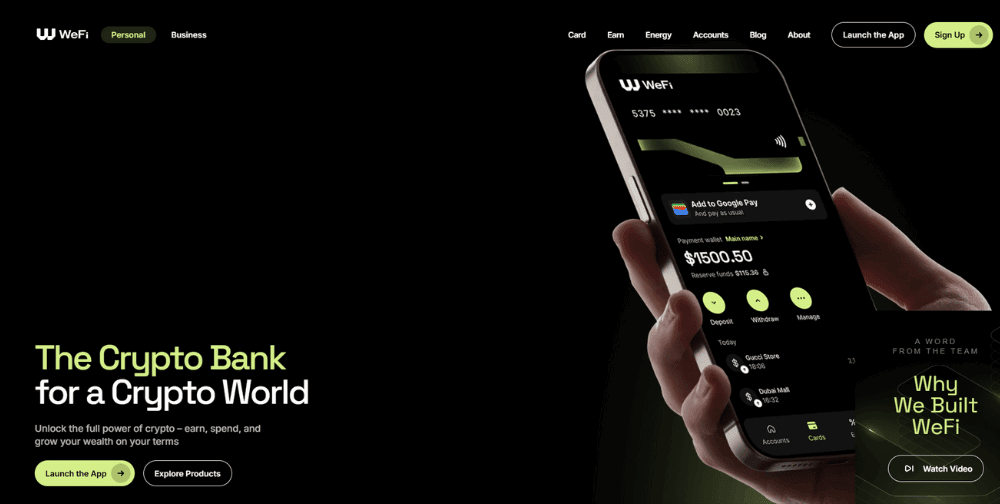How WeFi Gives You More Control When Sending Money Abroad

Sending money abroad has always come with trade-offs. You give up control over timing, accept whatever exchange rate your provider decides, and hope that the transfer will clear without unexpected delays or fees.
For millions of people, whether freelancers getting paid internationally, families supporting loved ones abroad, or businesses managing global operations, these rigid systems create more than just frustration. They create missed opportunities, unnecessary costs, and a lingering sense that you are not really in charge of your own money.
This is the reality WeFi is challenging. As a decentralized on-chain bank (or deobank for short), WeFi is built to give users back the control they lose when they rely on legacy remittance systems. By using blockchain infrastructure and programmable transfers, WeFi allows you to set the rules, automate conditions, and make cross-border transfers on your terms, not the bank’s. For anyone sending money across borders regularly, that is a game-changer.
What Traditional Money Transfers Still Get Wrong
Despite years of innovation in fintech, the core mechanics of international money transfers still look a lot like they did decades ago.
Transfers often only process during business hours, with weekends and holidays creating delays that no longer make sense in a 24/7 global economy. Providers regularly force conversions at rates that are significantly worse than the real market rate, pocketing the difference without giving users a choice. Fees are rarely transparent. You may see one headline fee up front, only to discover hidden charges or intermediary costs that shrink the final amount your recipient receives.
The most frustrating part is the lack of choice. You don’t get to decide when the transfer executes or at what exchange rate. You cannot see where delays are happening in the system. Once you press “send”, your money disappears into a black box until it finally lands in the recipient’s account.
For everyday users, this is an inconvenience. For people who rely on regular international transfers to manage income, family support, or business expenses, it’s a structural problem. The rigidity of traditional systems forces you to absorb risks and inefficiencies that shouldn’t exist in a digital-first world. This is especially true for those sending money abroad consistently, where every delay or poor conversion rate compounds over time.
Why Financially Savvy Users Need More Than Speed
Many money transfer platforms have marketed themselves on speed. And to be fair, progress has been made. Transfers that once took five days now take one. Some apps even offer near-instant transfers between certain corridors.
But speed alone does not equal control.
A financially savvy user doesn’t just want funds to arrive quickly. They want them to arrive strategically. That might mean holding off on a transfer until the exchange rate hits a favorable level. It might mean scheduling transfers to align with payroll cycles or recurring bills. It might mean splitting one payment into multiple smaller transfers to manage risk.
Traditional platforms do not offer these capabilities. They’re designed to move money as quickly as possible, on their own terms, with no room for user-defined logic. There is no way to automate transfers, no way to set custom conditions, and no way to program the flow of money around your own strategy.
For users who think beyond convenience, this is a dealbreaker. They want autonomy, timing, and programmability, not just speed. And when it comes to sending money abroad, these factors are the difference between wasted costs and optimized financial flows.
How WeFi Improves International Money Transfers
This is where the concept of a deobank comes in. A deobank is not a digital wrapper on top of legacy systems. It’s a financial platform built natively on blockchain infrastructure. Every transfer, account, and transaction runs on-chain, giving users visibility, transparency, and control that traditional systems cannot match.
WeFi, as the first deobank, brings programmable transfers into the mainstream. Instead of forcing you into rigid flows, WeFi lets you define your own conditions for moving money abroad. For example, you can:
- Set triggers based on FX rates or dates: Automate a transfer to execute only when a specific exchange rate is met, or on a particular date each month.
- Avoid unnecessary conversions: Keep funds in stablecoins or crypto until you are ready to convert.
- Automate recurring remittances: Use smart contract logic to schedule transfers for family support, payroll, or recurring bills, with full visibility on when and how they execute.
Because all of this happens on-chain, transfers are not bound by office hours or banking holidays. The system operates 24/7, 365 days a year. Delays caused by intermediaries vanish. And every step of the process is transparent, verifiable, and under your control.
For anyone sending money abroad, that means confidence in knowing your transfers happen on your terms, not at the mercy of hidden processes.
When Speed Isn’t Enough in Cross-Border Transfers
To understand the difference WeFi makes, it helps to imagine real-world scenarios.
Take a freelancer working remotely for clients overseas. Instead of accepting whatever exchange rate their bank offers when a payment comes in, they can set a condition: “Convert this payment to my local currency only if the rate improves by 2%”. That small change could mean hundreds of dollars saved over the course of a year.
Or think about a digital nomad living in multiple countries throughout the year. They can automate monthly transfers from one currency to another, ensuring they always have funds available where they live, without manually initiating each transfer or paying unnecessary fees.
International families also benefit from this system. Parents sending money to children abroad for tuition or living expenses can schedule recurring payments that execute on specific dates, avoiding the stress of delays caused by bank holidays.
And remote teams managing payroll across borders can use programmable transfers to ensure payments are made simultaneously to multiple recipients, all with transparent records.
In each of these cases, speed matters. But timing and programmability matter more. WeFi gives users both. For anyone regularly sending money abroad, this combination is the difference between losing control and gaining an intelligent, user-led system.
Sending Money Abroad Needs Programmable Transfers
The truth is that rigid remittance flows are outdated. In a global financial system where assets, payments, and contracts can be programmed, there is no reason for users to be stuck with “send now, at our rate, with our fees”.
Programmable transfers are the natural next step. They allow users to design how their money moves, when it moves, under what conditions, and at what cost. Instead of adapting your financial life to the constraints of old systems, you can shape the system to fit your needs.
Deobanks like WeFi make this possible. They’re not just creating faster transfers. They’re creating smarter transfers that are transparent, customizable, and user-led. For people sending money abroad, this is the evolution that finally makes international transfers work the way they should.
Smarter Transfers Start With More Control
At the core of it, WeFi’s promise is simple: when you send money abroad, it should happen on your terms, not the bank’s.
Control over timing, rates, and automation is no longer a luxury. It’s becoming essential for anyone who manages money internationally. Whether you’re an individual supporting your family, a freelancer paid from abroad, or a business operating globally, the old systems are not built for you.
WeFi transforms cross-border transfers into intelligent, user-driven flows. It replaces blind trust with transparency, rigid rules with programmable conditions, and delays with 24/7 access.
The era of “send and hope for the best” is ending. The future is programmable, and it is already here for anyone sending money abroad.




